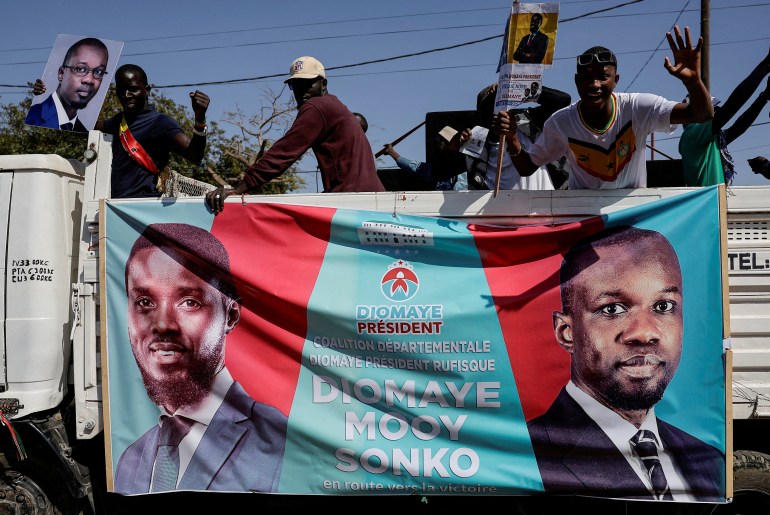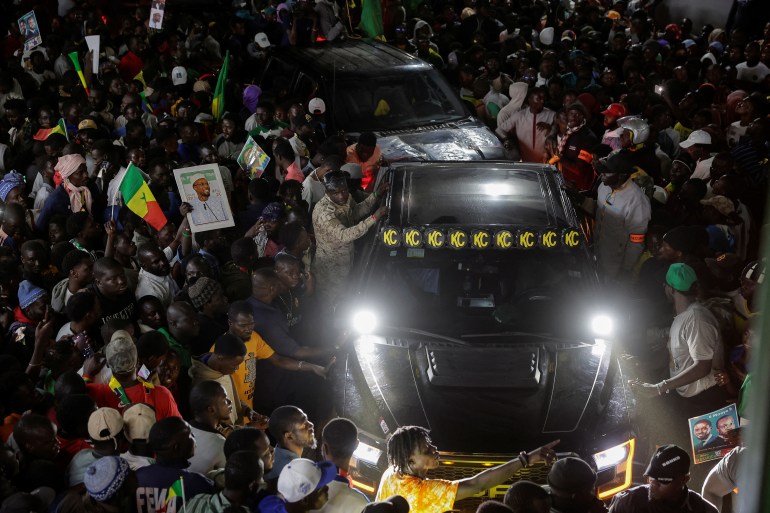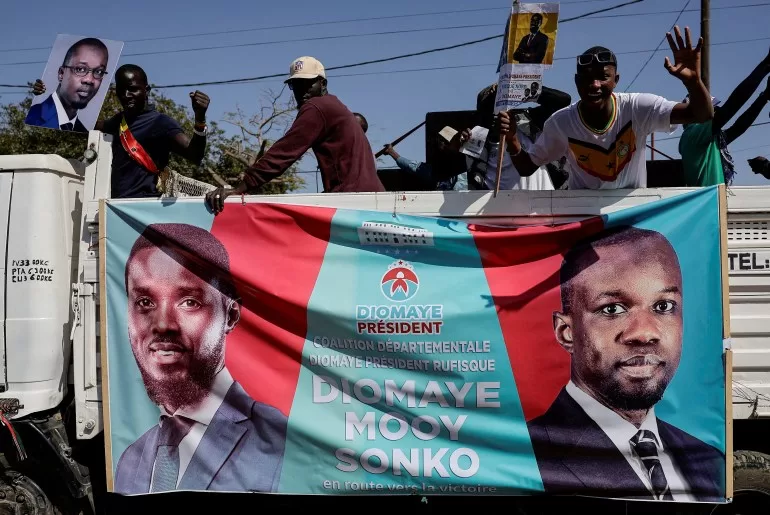The release of firebrand Sonko and his right-hand man Faye could help opposition chances in the March 24 election to replace outgoing President Macky Sall.
Firebrand politician Ousmane Sonko and his close aide Bassirou Diomaye Faye were released late on Thursday in a move that could boost the opposition’s chance to win in the March 24 election and replace outgoing President Macky Sall.
Sonko, the charismatic anti-establishment politician who has won over crowds of youngsters by promising to fight corruption, had been behind bars since July, serving a two-year sentence for corrupting the youth. He was barred from running for the presidential race due to a separate case involving defamation charges.
His supporters maintain Sonko’s legal woes were an outcome of efforts to keep him away from competing in the elections. Excluded from the presidential race, Sonko urged his supporters to vote for Faye, a lesser-known politician and deputy of his now-dissolved PASTEF party. “Ousmane is Diomaye,” was the message his supporters spread from prison. Faye was also in jail but on administrative detention — a state of arrest that does not bar him from contesting in the election.
“Sonko represents hope for the entire nation,” said Cheick Diara, a young Senegalese man cheering in the streets of Dakar on his release. “Look what is happening around the youth, they want change – we want Sonko in power,” he said.

Faye’s mission is now to bank on Sonko’s popularity to win the country’s top job. Dressed in a sky-blue tunic and a white cap, he was welcomed as a hero by a crowd gathered in front of Cap-Manuel prison in the capital Dakar as the news of his release started circulating.
“The way from prison to the presidential palace is now paved,” said human rights activist Alioune Tine, noting that their release will re-energise the opposition front. “President Sall thought he could neutralise their popularity by putting them in prison, but he understood that it wasn’t working – he was forced to release them,” added Tine, who held a key role in mediating between Sall and the opposition following Sall’s attempt to delay the vote, which was originally set for February but then postponed by the outgoing president.
Faye’s programme includes the establishment of a new national currency and the renegotiation of the country’s mining and energy contracts between the government and private conglomerates. Central to his campaign is also a review of the relations with former colonial power France whose economic interests in the country are perceived by some in the opposition as a form of neo-colonialism.
He has also promised to tackle youth unemployment: Three out of 10 Senegalese aged 18 to 35 are jobless. The crisis is further exacerbated by the speed at which the population is growing – it doubles every 25 years, according to Afro Barometer data.
“This is a radical youth for a radical change who wants to see a new way of doing politics,” said Hawa Bo, associate director of the Open Society Foundation. “They want to break with clientelism, endemic corruption and lack of accountability,” she added.
The anti-establishment presidential hopeful’s election could have significant implications for the region’s economy and the country’s plan to become an oil producer by the end of 2024. Senegal is the region’s number one recipient of foreign aid, including a $1.8bn loan from the International Monetary Fund.

Meanwhile, Sall’s governing Alliance of the Republic party has bet on Amadou Ba, a former prime minister. He ran the Ministry of Finance and Economic Planning from 2013 to 2019 and was the country’s top diplomat between 2019 and 2020. His victory would mean policy continuity with the previous government, something that would likely reassure foreign investors.
Western allies are also closely monitoring developments in Senegal after months of protests have rocked Senegal’s image as a rare bastion of stability in a region plagued by military coups.
The latest round of demonstrations took place after Sall postponed the elections originally planned for February. The decision plunged Senegal into uncertainty with critics saying the move amounted to a constitutional coup for Sall to get a third mandate. Presidents in Senegal have a two-term limit. The Constitutional Court overruled the delay and elections were finally set for March 24.
In an attempt to quell tensions, Sall passed a controversial amnesty law – under which Sonko and Faye were released on Thursday – that critics have said is an attempt to make a clean exit from power and avoid being targeted once he is out of office.
Sall’s second term was marked by restrictions on civil liberties, a ban on demonstrations and internet shutdowns. At least 40 people were killed and more than a thousand political opponents ended in jail since 2021, according to Human Rights Watch.
